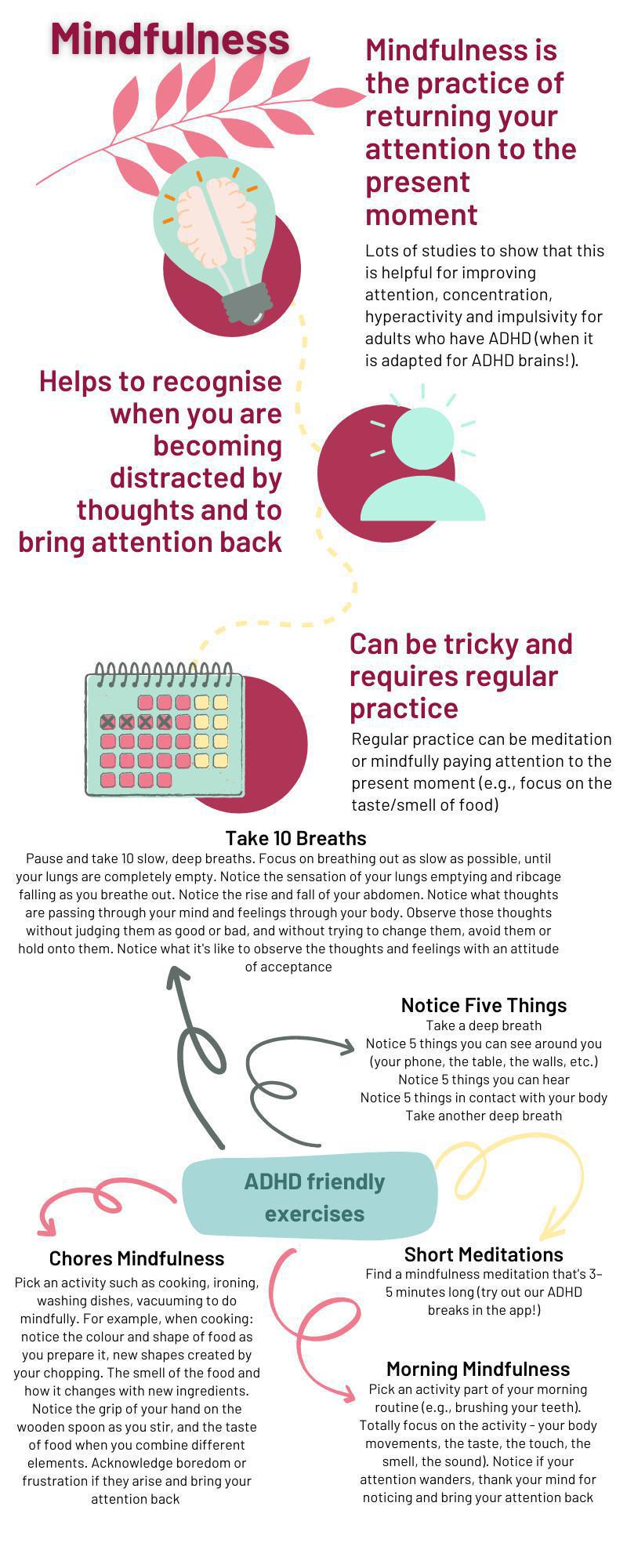Mindfulness
- A lot of research has shown the benefit of mindfulness for adults who have ADHD for improving attention and concentration, as well as reducing hyperactivity and impulsivity. This is because mindfulness is the practice of returning your attention to the present moment.
- Mindfulness is the practice of becoming aware of your surroundings and paying attention to the present moment, without judgement. Mindfulness often involves practicing meditation by focusing on your breathing, the sounds around you, an object in your vision, or by directing your attention towards your body.
- Mindfulness is helpful for ADHD because it involves learning to recognise you’re your mind is wandering or when it is telling us something unhelpful and once we have recognised that, we can respond to our thoughts in a new way and re-connect to the present moment.
- Mindfulness can be tricky and requires regular practice. You can follow along to guided meditations or try to act more mindfully by paying closer attention to the present moment. This could by making an effort to eat slowly and focus on your food or by sitting on a bench and focusing on the bench supporting you or listening to the sounds of nature around you.
- You might also want to see if there are mindfulness courses running virtually or locally that you can attend. These are often done in groups, which can provide a supportive space to hear about how other people are finding their mindfulness practices. It is particularly helpful to do mindfulness specifically geared towards ADHD brains, as these practices are more likely to be brief and incorporate mindful movement. You can try our ADHD Breaks as an example.
- The Mindfulness Prescription for Adult ADHD by Lydia Zylowska is a self-help book on mindfulness tailoured to ADHD.
- Below are some ADHD-friendly mindfulness techniques you can also try:
- Notice Five Things: Take a deep breath and relax for a moment. Notice five things you can see around you (your phone screen, the table, the walls, etc.). Notice five things you can hear (the traffic outside, birds, the television in another room, etc.). Notice five things in contact with your body (your trousers, your watch, the air around your nostrils, etc.). Notice five things in contact with your body (your trousers, your watch, the air around your nostrils, etc.). Take another deep breath.
- Brief Guided Meditations: Meditation practices that are 3-5 minutes long.
- Morning Mindfulness: Pick an activity that is part of your daily morning routine (brushing your teeth, shaving, having a shower). When you do it, totally focus on what you’re doing: the body movements, the taste, the touch, the smell, the sight, the sound. Again and again, your attention will wander. Once you realise it has, gently acknowledge it, note what distracted you, and bring your attention back to the activity.
- Mindfulness of domestic chores: Pick an activity such as cooking, ironing clothes, washing dishes, vacuuming floors, and do it mindfully. For example, when cooking, notice the colour and shape of the food as you prepare it, new shapes created by your chopping and how each slide looks different. The smell of the food and how it changes when you add different ingredients. Notice the grip of your hand on the spoon or spatula and your movement as you stir. Notice the taste of the food when you combine different elements of the meal and how they change. Acknowledge boredom and frustration if they arise, and bring your attention back to the task.
- Take Ten Breaths: Pause for a moment and take 10 slow, deep breaths. Focus on breathing out as slowly as possible, until your lungs are completely empty. Notice the sensations of your lungs emptying and your ribcage falling as you breathe out. Notice the rising and falling of your abdomen. Notice what thoughts are passing through your mind. Notice what feelings are passing through your body. Observe those thoughts without judging them as good or bad, and without trying to change them, avoid them, or hold onto them. Notice what it’s like to observe those thoughts and feelings with an attitude of acceptance.
Bachmann, K., Lam, A. P., Sörös, P., Kanat, M., Hoxhaj, E., Matthies, S., Feige, B., Müller, H., Özyurt, J., Thiel, C. M., & Philipsen, A. (2018). Effects of mindfulness and psychoeducation on working memory in adult ADHD: A randomised, controlled fMRI study. Behaviour Research and Therapy, 106, 47–56. https://doi.org/10.1016/j.brat.2018.05.002
Cairncross, M., & Miller, C. J. (2020). The Effectiveness of Mindfulness-Based Therapies for ADHD: A Meta-Analytic Review. Journal of Attention Disorders, 24(5), 627–643. https://doi.org/10.1177/1087054715625301
Gallant, S. N. (2016). Mindfulness meditation practice and executive functioning: Breaking down the benefit. Consciousness and Cognition, 40, 116–130. https://doi.org/10.1016/j.concog.2016.01.005
Hepark, S., Janssen, L., de Vries, A., Schoenberg, P. L. A., Donders, R., Kan, C. C., & Speckens, A. E. M. (2019). The Efficacy of Adapted MBCT on Core Symptoms and Executive Functioning in Adults With ADHD: A Preliminary Randomized Controlled Trial. Journal of Attention Disorders, 23(4), 351–362. https://doi.org/10.1177/1087054715613587
Mitchell, J. T., McIntyre, E. M., English, J. S., Dennis, M. F., Beckham, J. C., & Kollins, S. H. (2017). A Pilot Trial of Mindfulness Meditation Training for ADHD in Adulthood: Impact on Core Symptoms, Executive Functioning, and Emotion Dysregulation. Journal of Attention Disorders, 21(13), 1105–1120. https://doi.org/10.1177/1087054713513328
Modesto-Lowe, V., Farahmand, P., Chaplin, M., & Sarro, L. (2015). Does mindfulness meditation improve attention in attention deficit hyperactivity disorder? World Journal of Psychiatry, 5(4), 397–403. https://doi.org/10.5498/wjp.v5.i4.397
Poissant, H., Moreno, A., Potvin, S., & Mendrek, A. (2020). A Meta-analysis of Mindfulness-Based Interventions in Adults with Attention-Deficit Hyperactivity Disorder: Impact on ADHD Symptoms, Depression, and Executive Functioning. Mindfulness, 11(12), 2669–2681. https://doi.org/10.1007/s12671-020-01458-8




